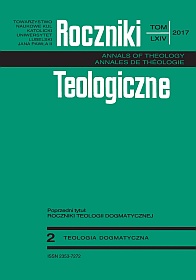A Theory of Religious Language
Abstract
The bibliography of religious language in Poland is rather rich, yet it mostly covers the material aspect of this language variety; quite infrequently does it touch upon its theory. Therefore, the proposal put forwards in the 1970s by Anton Grabner-Haider (* 1940) − Austrian researcher, currently professor emeritus − seems particularly worth familiarizing with. Grabner-Haider has proposed a theory of “critical significance” (kritische Bedeutsamkeit) of religious language and he constantly develops its ramifications. His theory rests on the concept of theology as “systematized knowledge,” which is “the height of systematizing of religious language.” Corollary of the above thesis is the statement that religious language can be a legitimate research subject. Theology is built on the foundation of religious language, which means it has a syntactic and a semantic aspect. Thus, religious language has its assertive (confirming a status quo) and non-assertive (symbols, images, speech acts) components. Grabner-Haider uses these structures to analyse religious texts: biblical, dogmatic, liturgical, works of the Fathers of the Church and of theologians. Grabner-Haider challenges the positivist view of language held by the representatives of Vienna Circle and assigns a greater objective importance to religious language within its own system of reference.
References
Bibliografia języka religijnego 1945-2005, zebrała i zestawiła M. Makuchowska, Biblos, Tarnów 2007.
Biser E., Theologische Sprachtheorie und Hermeneutik, Kösel, München 1970.
Bocheński J.M., Logik der Religion, Schöningh, Köln 1968.
Courth F., Die Sakreamente, Herder, Freiburg i.Br. 1995.
Ferré F., Logic and God, London 1962.
Góźdź K., Wiedza i wiara religijna, „Roczniki Teologiczne” 63(2016), z. 2, s. 5-26.
Grabner-Haider A., Glaubenssprache. Ihre Struktur und Anwendbarkeit in Verkündigung und Theologie, Herder, Wien 1975.
Grabner-Haider A., Semiotik und Theologie. Religiöse Rede zwischen analytischer und hermeneutischer Philosophie, Kösel, München 1973.
Grabner-Haider A., Sprachanalyse und Religionspädagogik. Wissenschaftstheoretische und didaktische Überlegungen, Benzinger, Zürich 1973.
Grabner-Haider A., Theorie der Theologie als Wissenschaft, Kösel, München 1974.
Grochowiak S., Maciejewski J., Poezja polska, t. I, PIW, Warszawa 1973.
Haller R., Wiener Kreis, (Herder), LThK(3), X, kol. 1160.
Język religijny dawniej i dziś, t. I: Materiały z konferencji, Gniezno 15-17 kwietnia 2002, red. S. Mikołajczak, T. Węcławski, Wydawnictwo „Poznańskie Studia Polonistyczne”, Poznań 2004.
Język religijny dawniej i dziś, t. II: Materiały z konferencji, Gniezno 3-5 czerwca 2004, red. S. Mikołajczak, T. Węcławski, Wydawnictwo „Poznańskie Studia Polonistyczne”, Poznań 2005.
Koterski A., Koło Wiedeńskie, (Polskie Towarzystwo Tomasza z Akwinu), PEF, V, s. 727-732.
Kucała M., Od Bogurodzicy do Madonny. Nazywanie Matki Boskiej w historii polszczyzny, w: O języku religijnym. Zagadnienia wybrane, red. M. Karpluk, J. Sambor, RW KUL, Lublin 1988, s. 133-144.
Langkammer H., Hymny chrystologiczne Nowego Testamentu, Księgarnia św. Jacka, Katowice 1976.
Langkammer H., U podstaw chrystologii Nowego Testamentu, Wyd. Wrocławskiej Księgarni Archidiecezjalnej, Wrocław 1976.
Lies L., Sakramententheologie. Eine personale Sicht, Styria, Graz 1990.
Makuchowska M., Język religijny, w: Najnowsze dzieje języków słowiańskich. Język polski, red. S. Gajda, Uniwersytet Opolski – Instytut Filologii Polskiej, Opole 2001, s. 369-402.
Mc Quarrie J., God-Talk, London 1967.
Międzynarodowa Komisja Teologiczna, Teologia dzisiaj. Perspektywy, zasady i kryteria, DEHON, Kraków 2012.
Mildenberger F., Theorie der Theologie, Calwer, Stuttgart 1972.
O języku religijnym. Zagadnienia wybrane, red. M. Karpluk, J. Sambor, RW KUL, Lublin 1988.
Ostatnie przed wielkim milczeniem. Język i religia, red. E. Przybył, Zakład Wydawniczy NOMOS, Kraków 2001.
Ramsey I.T., Religions Language. An Empirical Placing of Theological Phrases, New York 1963.
Schneider J., Einführung in die Methoden der biblischen Exegese, Echter, Würzburg 1971.
Smith J.E., Experience and God, New York 1968.
Stręciwilk J., Bogurodzica, EK, t. II, kol. 723-724.
Szymik S., Współczesne modele egzegezy biblijnej, Wydawnictwo KUL, Lublin 2013.
Św. Augustyn, Wyznania, PAX, Warszawa 1992.
Święta Teresa od Jezusa, Dzieła, t. II, Wydawnictwo Karmelitów Bosych, Kraków 1962.
Vorgrimler H., Sakramententheologie, Patmos, Düsseldorf 1990(2).
Zimmermann H., Formen und Gattungen im Neuen Testament, w: Einführung in die Methoden der biblischen Exegese, red. J. Schneider, Echter, Würzburg 1971, s. 232-260.
Copyright (c) 2017 Roczniki Teologiczne

This work is licensed under a Creative Commons Attribution-NonCommercial-NoDerivatives 4.0 International License.





